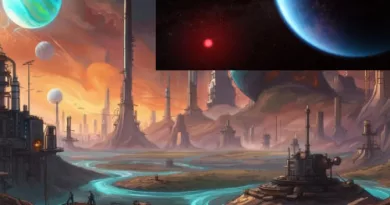Smells like Alien Life? Possible biosignature detected on distant ocean world K2-18 b (science news).
Well, well, well. If it isn’t the universe dangling the prospect of extraterrestrial life just close enough for us to trip over our own telescopes. Fresh off the data stream from the James Webb Space Telescope (JWST), our scientific cousins have reported tantalising new evidence for a potential biosignature on the distant exoplanet K2-18 b – a place that’s rapidly becoming the galactic equivalent of a suspiciously fragrant stranger at the interstellar pub.
You may recall K2-18 b from previous scientific gossip – it’s a “hycean” world, which is a posh way of saying it’s possibly got a vast global ocean under a hydrogen-rich atmosphere. Sort of like Earth if it overdosed on bubble bath and moved to a rough M-class neighbourhood. Back in 2023, the JWST sniffed out methane and carbon dioxide in the planet’s atmosphere, along with a faint whiff of dimethyl sulfide (DMS) – a molecule produced on Earth mostly by plankton, sea foam, and the kind of biological shenanigans you don’t find outside of a biology textbook. The only problem? That DMS detection had the statistical heft of a hungover badger guessing the lottery numbers.
But now – cue dramatic music – the JWST’s mid-infrared instrument has gone and done it again, this time focusing on a different chunk of the spectrum. Scientists led by Nikku Madhusudhan at the University of Cambridge have just published results showing independent evidence for DMS and/or its chemical cousin, dimethyl disulfide (DMDS), in the atmosphere of K2-18 b. The detection clocks in at 3σ significance – which, in cosmic terms, is the equivalent of the universe nudging us and going, “Oi, you might want to have a look at this.”
Both DMS and DMDS are molecules that, on Earth, are overwhelmingly associated with biological sources. They’re made by life. The pong of plankton. The scent of sea slime. The eau de Earthling. And they’re not the sort of thing we expect to just waft out of a lifeless planet unless something very odd is going on with its geology or chemistry – or there’s something alive making them.
Now, before we get too carried away imagining microbial mermaids waving from the ocean depths, there are caveats. The signal isn’t strong enough to stand on the nearest alien mountaintop and proclaim “We Are Not Alone” just yet. It’s significant, but not conclusive. There’s also a murky overlap between the fingerprints of DMS and DMDS in this part of the spectrum – they look a lot alike, spectroscopically speaking – so while we know something smelly is there, we’re not 100% sure which molecule it is.
And just to keep everyone honest, there are hypothetical non-biological ways to make these compounds, involving exotic chemical reactions, comets, and probably a dash of wishful thinking. But the amounts detected are much higher than what you’d expect from those processes alone, especially in the planet’s puffy hydrogen-rich atmosphere. The scent, as it were, lingers.
The study, published today in The Astrophysical Journal Letters, marks a key step in what could become one of the most significant scientific quests of our age. A habitable-zone planet, dripping in ocean and atmosphere, is now showing signs of molecules that – on Earth, at least – are only made by life. Scientists are rightly cautious. It will take more observations, more models, and, frankly, a lot more telescope time to turn this 3σ “maybe” into a “holy space squid, yes.”
Here at SFcrowsnest magazine, we adore this kind of story. It’s the stuff of pulp and prophecy, where science fiction edges cheekily into science fact. Is it aliens? Probably not yet. But is it a planet whose skies might contain the chemical farts of alien plankton? Quite possibly.
So pop the kettle on and stare up at the stars tonight. Somewhere around 120 light years away, a world wrapped in clouds and mystery might be home to the first biological whiff of something not born of Earth. And if nothing else, it’s a reminder that the universe may be stranger – and more aromatic – than we ever imagined.





